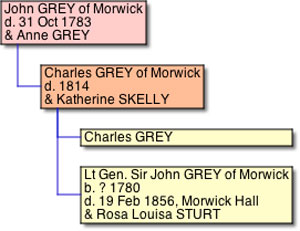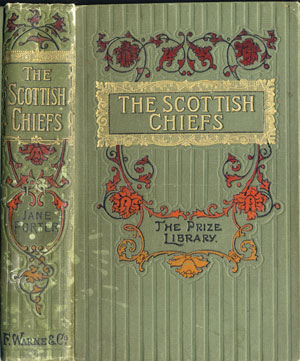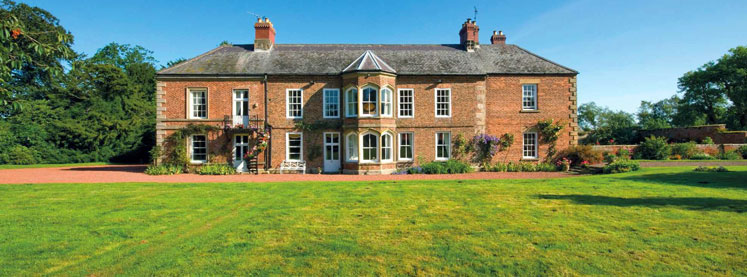
Single Sheet
Charles Grey Esquire,
Morwick
Near
Alnwick
Northumberland
How many days, (nay weeks) have passed, since I received my dear paternal friend’s letter! By this time, perhaps, he will have numbered his adopted Daughter among the ungrateful ones of the earth! Shall I ever deserve that epithet? I hope not; I trust that I have too lively a sense of kindness; and too retentive impressions of its effects, ever to forget hours of happiness, and instances of friendship. I have enjoyed moments at Morwick, in the society of its dear family, which made me forget many cares; and which taught me how to console myself under their anxieties, when their remembrance should reoccur. Surely, this is a benefit which cannot be forgotten? for, while I remain in this everchanging state I shall have constant need of that balm of Gilead, which I tasted with such pleasure on the banks of the Coquet. I shall often, in my mind, retrace our evening walks in the West wood; and repeat to myself the substance of our discourse; I shall weigh the Good and Evil of this life, in the balance which you held; I shall look through your eyes I shall often, in my mind, retrace our evening walks in the West wood; and repeat to myself the substance of our discourse; I shall weigh the Good and Evil of this life, in the balance which you held; I shall look through your eyes, on the gaieties of this world: But why should I say, through your eyes? are mine to eager to fix themselves on the pageantries of the Day? No; I am sick of the splendours, the empty shows of society; I turn from them with weariness: I have no fear of them; they are not sufficiently attractive, to disengage me from myself. Indeed, I know of no influence strong enough to draw the heart from its own interests, but the power of Heaven. When once the eye of the mind, can penetrate through the veil of clay, “the greater glory dims the less;” what is all-lovely in this world, all-precious, all-desirable, all-blissfully-fades before the blaze and promise, of celestial perfection and felicity. It is this glimpse of Paradise, which gives a Philosophy to Human Nature, that overcomes the World: It imparts heroism, even to the bosom of Woman, and dries her tears, when they are ready to fall. O Religion, thou Angel of Peace to Man! Thou soother of our Cares – thou Healer of all our wounds – thou author of delight – thou Dispenser of Immortality! When I forsake thee, when I even shade my sight one moment from thy Divine countenance, the steel of despair will enter my soul! You will allow me, dear Mr Grey, to write thus; for, though you are yet on earth, your “conversation is in Heaven;” and you love to speak upon a subject that is dear to your heart; and surely I must love to discourse of that Power, which is my best friend, that Power, which alone enters into all my thoughts; that Power, with whom I confide myself; at the foot of whose throne I lie, either to receive Life, or to be slain. To this temper I strive to bring my mind: It was this temper, my dear Father, which you would have taught me. I say. I strive; for I confess, that I often feel the rebel in my bosom; I often feel impatience; undue anxiety; and a wish, to shape my future fate, according to my own desires. Even while I acknowledge this weakness, my own reason, as well as revelation, tells me, “that ignorant of ourselves,” we often wish “our own harm; and, that he who trusts in the guardianship of his Redeemer, confides in a Friend, who will stretch out his hand to save him, even when “he is ready to perish.” You, my dear Sir, have frequently experienced this truth, during your pilgrimage through life; and I have no doubt, but that you will find, less gall in you last ?sup, than you have now reason to expect. Your amiable, pious and affectionate children, must surround your board with blessedness; and though you have one “prodigal son.” Yet, I firmly believe that springing from such a stock – acquainted with the virtue of his family – and loving with tenderness, the different members of it, he will not always, be a wanderer from the right path; he will at some future period, seek “forgiveness of his father” Pardon, my revered friend, if I have touched upon a subject that I ought not? Do not call me impertinent and presuming! Affection, interest in all a friend’s concerns; and is apt to appear officious, when one obeys the dictates of real regard and solicitude. If I have erred, forgive me, as you would pardon the penitent Son, whose ultimate return to your esteem and love, I have dared to foresee! You know, that you have your moments of Prophesy; then why may not I? Young maidens “are allowed to” see visions, and dream “dreams”, as well as Sages: May Heaven grant a happy completion, to both our predictions!
But I have got down the second side of this immense sheet of paper, without accounting to you for my long apparent neglect of your valuable letter! I shall only say, in a few words, that from the instant at which I joined my brother Robert at Grantham, until this day, I have been whirled about in a vortex of business of all sorts; and even now, I am not emancipated from writing letters, Etc on half a dozen labyrinthine affairs. I found my Maria better than I had hoped; but yet in a very delicate, and uncertain state; she is tolerable one day, and the next, can hardly draw her breath. I believe that we shall stay here, until the end of August. My protracted visit in Northumberland, hurt my sister much; she was in too critical a situation, to bear repeated disappointments with impunity. I heard yesterday from Mr. Stockdale (1) : He seems likely to remain some time at Lesbury; and indeed, I am much mortified to find, that the few people whom I have seen in the south, are absolutely dead to his Memoirs; I cannot put a spark of life into one of them: in fact, impressions have been made so generally in his disfavour, that they do not like to subscribe: This is a painful subject to write upon to him; but I must do it as tenderly, as possible; for I would not intentionally deceive him. I am afraid, that he must not at all depend on the subscription list to defray his printing expenses; people may buy, who are averse to register their names. I was so short a time in London, in my way to Margate, that it was not in my power to learn of Messrs Jerningham and Beville, what they had done for their old friend. I am particularly distressed at such cold prospects, for fear, that the frigidity, may be thought to belong, in any degree, to those, whose hopes, promised a warmer reception.
Perhaps by this time you have heard from your friend Mr Seaton? If not I flatter myself, that it will give you pleasure to learn, that my Mother and I, met him, and Mrs Pierce, in the Ditton Stage Coach. As I was speaking of Northumberland to my Mother, Mrs Pierce asked me if I knew Mr Grey of Morwick; of course I said I did – and a mutual recognition immediately took place; the good family called upon us the next day; and we returned the visit. It would be needless to say that the burthen of our conversation, was, Morwick, and its inhabitants. Mrs Pierce seems to have a Mother’s affection for all your children, and Miss Pierce spoke very kindly of Mr Charles. When I go again to their house, I shall see the pictures of my dear Miss Grey and Catherine. Will you tell my friend Anne, that I shall always be happy to have a letter from her and that I shall acknowledge such favours, as punctually as I can; but, whilst I am in such a whirlpool of plagues, I have little power, of being either an amusing, or a regular correspondent: However, she will pardon all unintentional errors, for the sake of the sincerity, of one, who has had real reason, most truly to love her. When you either write to, or see Mr? Terrot, will you return him my thanks for his books; and inform him, that as soon as I have been able to read his books with the care they deserve, I will do as he requested, and acknowledge my obligation, by my own pen.
Owing to my short sojourn in Town, I could not go to hear Mr Newton; but please he ?over he lives, I will do so, on my return.
I am afraid that you will hardly be able to decypher, this ill-scrawled epistle; but bad pens, and frequent interruptions, must plead my apology. When you have a leisure hour, which you wish to devote to charity, sacrifice it to your very respectful, obliged, and affectionate Daughter,
Jane Porter.
PS
It is said, “that the place of honour, in a woman’s letter, is the postscript” – therefore, I do not hesitate to make it the bearer of my respects to Mrs Grey; and my best wishes for the restoration of her health.
Prospect House – Margate.
July 31st 1805

Stockdale, Percival (1736–1811), soldier, clergyman, writer, and anti slavery campaigner was born Oct. 26, 1736, in the village of Branxton, of which his father, the Rev. Thomas Stockdale, was vicar, and also perpetual curate of Cornhill near the Tweed. He was educated for six years at the grammar-school of Alnwick, and afterwards at that of Berwick, where he studied the Greek and Latin classics, and would have been a neighbour of the Greys at Milfield. He was Vicar of Lesbury and Long Houghton. His mother was Dorothy Collingwood. A collection of his Poems was published at Alnwick in 1800. The obituary in The Gentleman's Magazine was by the novelist Jane Porter.

